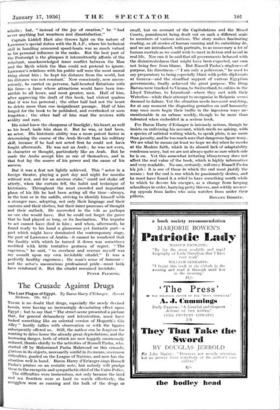The Crusade Against Drugs The Last Plague of Egypt. By
Baron Harry d'Erlanger. (Loyal. Dickson. 10s. 6d.)
THERE is no doubt that drugs, especially the newly devised heroin, were having an increasingly devastating effect upon Egypt : but to say that " The street-scene presented a picture that, for general debauchery and intoxication, must have looked something like an oriental version of Hogarth's Gin Alley " hardly tallies with observation or with the figures subsequently offered us. Still, the author can be forgiven for Wanting to drive home the already great depredations, and the increasing danger, both of which are now happily enormously reduced, thanks chiefly to the activities of Russell Pasha, who, started off by Mahommed Pasha Mahmoud on this crusade, glorious in its objects, necessarily sordid in its means, overcame difficulties, goaded on the League of Nations, and now has the situation well in hand. Baron Harry d'Erlanger sings Russell Pasha's praises on an ecstatic note, but nobody will grudge these to the energetic and sympathetic chief of the Cairo Police.
The difficulties were tremendous, not only because the land and sea frontiers were so hard to watch effectively, the smugglers were so cunning and the bulk of the drugs so small, but on account of the Capitulations and the Mixed Courts, punishment being dealt out on such a different scale to members of various nations. The story makes fascinating reading, as all stories of human cunning and its outwitting do, and we are introduced, with portraits, to as unsavoury a lot cif human mortals as we could wish to meet in fiction and avoid in real life. Nor can it be said that all governments behaved with the disinterestedness that might have been expected, our own not being free from blame. But Russell Pasha's singleness of purpose, his directness—" I am only a policeman," he used to say preparatory to being especially blunt with polite diplomats at Geneva—and the steadfast support of various Egyptian governments, finally achieved the great purpose. The Drug Barons were tracked to Vienna, to Switzerland, to cabins in the Lloyd Triestino, to Istamboul—where they met with their Waterloo—while their attempt to reorganise in Bulgaria seems doomed to failure. Yet the situation needs incessant watching, for at any moment the disgusting parasites on nalf humanity may once more begin their traffic in the ingenious ways un- mentionable in an urbane weekly, though to be more than tolerated when embedded in a serious book.
For Baron Harry d'Erlanger is intensely serious, though he insists on enlivening his account, which needs no spicing, with a species of satirical writing which, to speak plain, is no more than jocosity, and he too much uses that dangerous figure irony. We see what he means (at least we hope we do) when he mocks at the Moslem faith, which in its absurd lack of adaptability condemns usury, but we are not always quite so sure which side he is on. Yet this somewhat irritating idiosyncrasy does not affect the real value of the book, which is highly informative and very readable. No one, certainly, will envy Russell Pasha his job : it is one of those in which the end must justify the means : but the end is one which he passionately desires, and he must have found it a relief to have something worth while to which to devote his energies, as a change from keeping schoolboys in order, harrying petty thieves, and wittily answer, ing appeals from ladies who miss watches from under their






































 Previous page
Previous page